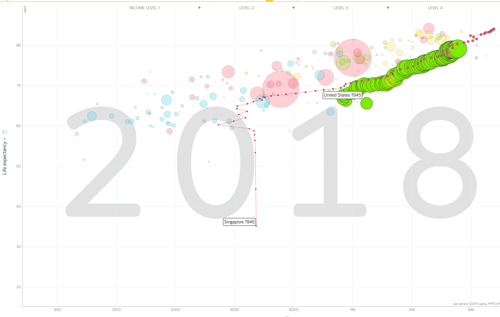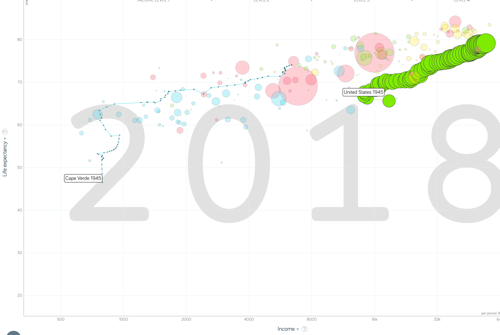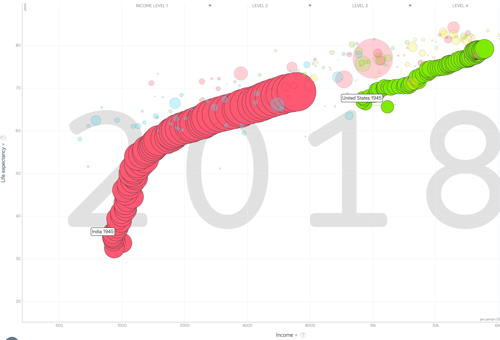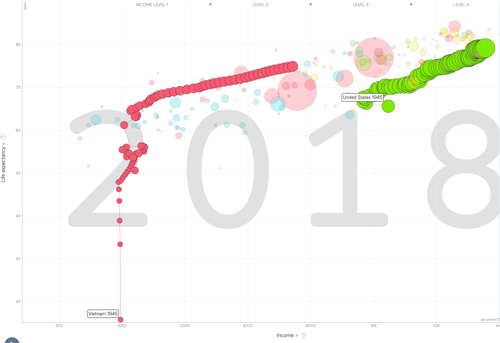J. Bradford DeLong's Blog, page 194
April 20, 2019
Mueller has referred questions of conspiracy and obstruct...
Mueller has referred questions of conspiracy and obstruction of justice to Congress. The natural response is that Congress now needs to open an inquiry. It might not turn out to be the prudent and savvy thing to do, depending on how things work out. It might turn out to be not just savvy and prudent but essential. We do not know. But we do know that it is what people of rectitude and sincerity would do. It needs to be done: Winston Churchill: Eulogy for Neville Chamberlain: "At the lychgate we may all pass our own conduct and our own judgments under a searching review. It is not given to human beings, happily for them, for otherwise life would be intolerable, to foresee or to predict to any large extent the unfolding course of events. In one phase men seem to have been right, in another they seem to have been wrong. Then again, a few years later, when the perspective of time has lengthened, all stands in a different setting. There is a new proportion. There is another scale of values...
...History with its flickering lamp stumbles along the trail of the past, trying to reconstruct its scenes, to revive its echoes, and kindle with pale gleams the passion of former days. What is the worth of all this? The only guide to a man is his conscience; the only shield to his memory is the rectitude and sincerity of his actions. It is very imprudent to walk through life without this shield, because we are so often mocked by the failure of our hopes and the upsetting of our calculations; but with this shield, however the Fates may play, we march always in the ranks of honour.
Whatever else history may or may not say about these terrible, tremendous years, we can be sure that Neville Chamberlain acted with perfect sincerity according to his lights and strove to the utmost of his capacity and authority, which were powerful, to save the world from the awful, devastating struggle in which we are now engaged���.
Herr Hitler protests with frantic words and gestures that he has only desired peace. What do these ravings and outpourings count before the silence of Neville Chamberlain���s tomb? Long, hard, and hazardous years lie before us, but at least we enter upon them united and with clean hearts...
#noted
April 19, 2019
Gregory Travis: How the Boeing 737 Max Disaster Looks to ...
Gregory Travis: How the Boeing 737 Max Disaster Looks to a Software Developer: "Design shortcuts meant to make a new plane seem like an old, familiar one are to blame.... This propensity to pitch up with power application thereby increased the risk that the airplane could stall when the pilots 'punched it'.... Pitch changes with power changes are common.... Pitch changes with increasing angle of attack, however, are quite another thing. An airplane approaching an aerodynamic stall cannot, under any circumstances, have a tendency to go further into the stall. This is called 'dynamic instability', and the only airplanes that exhibit that characteristic���fighter jets���are also fitted with ejection seats...
.... Everyone in the aviation community wants an airplane that flies as simply and as naturally as possible. That means that conditions should not change markedly, there should be no significant roll, no significant pitch change, no nothing when the pilot is adding power, lowering the flaps, or extending the landing gear.... The 737��Max... violated that most ancient of aviation canons and probably violated the certification criteria of the U.S. Federal Aviation Administration. But instead of going back to the drawing board and getting the airframe hardware right (more on that below), Boeing relied on something called the 'Maneuvering Characteristics Augmentation System', or MCAS. Boeing���s solution to its hardware problem was software.
I will leave a discussion of the corporatization of the aviation lexicon for another article, but let���s just say another term might be the ���Cheap way to prevent a stall when the pilots punch it,��� or CWTPASWTPPI, system. Hmm. Perhaps MCAS is better, after all. MCAS is certainly much less expensive than extensively modifying the airframe to accommodate the larger engines. Such an airframe modification would have meant things like longer landing gear (which might not then fit in the fuselage when retracted), more wing dihedral (upward bend), and so forth. All of those hardware changes would be horribly expensive. ���Everything about the design and manufacture of the Max was done to preserve the myth that ���it���s just a 737.���... That���s because the major selling point of the 737��Max is that it is just a 737, and any pilot who has flown other 737s can fly a 737��Max without expensive training, without recertification, without another type of rating. Airlines���Southwest is a prominent example���tend to go for one ���standard��� airplane. They want to have one airplane that all their pilots can fly because that makes both pilots and airplanes fungible, maximizing flexibility and minimizing costs. It all comes down to money, and in this case, MCAS was the way for both Boeing and its customers to keep the money flowing in the right direction....
MCAS is implemented in the flight management computer, even at times when the autopilot is turned off, when the pilots think they are flying the plane. In a fight between the flight management computer and human pilots over who is in charge, the computer will bite humans until they give up and (literally) die. Finally, there���s the need to keep the very existence of the MCAS system on the hush-hush lest someone say, ���Hey, this isn���t your father���s 737,��� and bank accounts start to suffer.... Like someone with narcissistic personality disorder, MCAS gaslights the pilots. And it turns out badly for everyone. ���Raise the nose, HAL.��� ���I���m sorry, Dave, I���m afraid I can���t do that.��� In the MCAS system, the flight management computer is blind to any other evidence that it is wrong, including what the pilot sees with his own eyes and what he does when he desperately tries to pull back on the robotic control columns that are biting him, and his passengers, to death....
It is astounding that no one who wrote the MCAS software for the 737��Max seems even to have raised the possibility of using multiple inputs, including the opposite angle-of-attack sensor, in the computer���s determination of an impending stall. As a lifetime member of the software development fraternity, I don���t know what toxic combination of inexperience, hubris, or lack of cultural understanding led to this mistake. But I do know that it���s indicative of a much deeper problem. The people who wrote the code for the original MCAS system were obviously terribly far out of their league and did not know it. How can they can implement a software fix, much less give us any comfort that the rest of the flight management software is reliable?
So Boeing produced a dynamically unstable airframe, the 737��Max. That is big strike No. 1. Boeing then tried to mask the 737���s dynamic instability with a software system. Big strike No. 2. Finally, the software relied on systems known for their propensity to fail (angle-of-attack indicators) and did not appear to include even rudimentary provisions to cross-check the outputs of the angle-of-attack sensor against other sensors, or even the other angle-of-attack sensor. Big strike No. 3. None of the above should have passed muster. None of the above should have passed the ���OK��� pencil of the most junior engineering staff, much less a DER...
#noted
Clive Crook pretends not to understand that Britain is a ...
Clive Crook pretends not to understand that Britain is a small island off the coast of Europe that will be much poorer without vibrant trade with Europe. Hence Britain is either (a) poor, (b) a member or quasi-member of the EU, or (c) a powerless rule-taker. No amount of national will spurred by Johnson's and Farage's desires to become prime minister can change that. Yet Crook somehow thinks or pretends to think that it can���that hard Brexit does not end in (a) or (c). I wonder why:
Clive Crook: Brexit: In the End, the U.K.'s Choice Will Be Stay or Go: "There���s no point in seeking compromise when no good compromise is possible..... what many see as an appealingly soft Brexit: so-called Norway-plus.... [It] would...leave the U.K. as a powerless rule-taker.... Support for Brexit comes chiefly from resentment at Britain���s lack of control over the policies that affect it. Norway-plus would make that problem vastly worse... politics... devoted to butting heads with the EU over successive policy innovations over which it has no say...
#noted
Cosma Shalizi (2011): Dives, Lazarus, and Alice: Weekend Reading

Weekend Reading: Cosma Shalizi (2011): "They've traded more for cigarettes / than I've managed to express"; or, Dives, Lazarus, and Alice: "Let us consider a simple economy with three individuals. Alice is a restaurateur; she has fed herself, and has just prepared a delicious turkey dinner, at some cost in materials, fuel, and her time. Dives is a wealthy conceptual artist1, who has eaten and is not hungry, but would like to buy the turkey dinner so he can "feed" it to the transparent machine he has built, and film it being "digested" and eventually excreted2. To achieve this, he is willing and able to spend up to $5000. Dives does not care, at all, about what happens to anyone else; indeed, as an exponent of art for art's sake, he does not even care whether his film will have an audience. Huddled miserably in a corner of the gate of Dives's condo is Lazarus, who is starving, on the brink of death, but could be kept alive for another day by eating the turkey...
...The sum total of Lazarus's worldly possession consist of filthy rags, of no value to any one else, and one thin dime. Since, however, he is starving, there is no amount of money which could persuade Lazarus to part with the turkey, should he gain possession of it.
Assume that everyone is a rational agent, with these resources and preferences. What does economics tell us about this situation?
Whatever Alice has spent preparing the turkey is a sunk cost, and irrelevant to deciding what to do next.
Alice would be better of selling the turkey to either Dives or Lazarus than keeping it for herself, and either trade would also benefit the buyer, so that's a win-win. Either trade would be Pareto-improving. However, neither trade is strictly better for everyone than the other: if she sells to Lazarus, Dives is disappointed, and if she sells to Dives, Lazarus starves. Of course, if we are being exact, Lazarus starves to death whether Alice keeps the turkey or sells it to Dives, so that trade makes Lazarus no worse off.
Lazarus can only offer ten cents. Since Dives would be willing to spend up to $5000, Alice will prefer to sell to Dives. Since Dives, being a rational agent, knows how much Lazarus can pay, he will offer 11 cents, which Alice will accept as the superior offer.
The market clears, Alice is 11 cents better off, Dives enjoys a consumer surplus of $4999.89, and Lazarus starves to death in the street, clutching his dime.Nothing can be changed without making someone worse off, so this is Pareto optimal.
And so, in yet another triumph, the market mechanism has allocated a scarce resource, viz., the turkey, to its most efficient use, viz., being turned into artificial shit. What makes this the most efficient use of the scarce resource? Why, simply that it goes to the user who will pay the highest price for it. This is all that economic efficiency amounts to. It is not about meeting demand, but meeting effective demand, demand backed by purchasing power....
You may be refusing to take this seriously, objecting that I have loaded the rhetorical deck pretty blatantly���and I have! (Though not more than is customary in teaching economics.) But this is the core of Amartya Sen's model of famines, which grows from the observation that food is often exported, at a profit, from famine-stricken regions in which people are dying of hunger. This occurs not just in cases like the USSR in the 1930s, but in impeccably capitalist situations, like British India. This happens, as Sen shows, because the hungry, while they have a very great need for food, do not have the money to buy it, or, more precisely, people elsewhere will pay more. It is thus not economically efficient to feed the hungry, so the market starves them to death.
I do not, however, want to end this on a completely gloomy note. As Sen said, the same market would feed the hungry if they could afford it, so the way to combat famines is to make sure they have money or paying work or both. (If in this country we don't have to worry about famine, it's because we've arranged things so that most of us do have those resources; we still have a hunger problem because our arrangements are imperfect.) The larger point is that while what is technologically efficient depends on facts of nature, what is economically efficient is a function of our social arrangements, of who owns how much of what. Economic efficiency may be a good tool, but it is perverse to serve your own tools, and monstrous to be ruled by them. Let us be thankful for the extent to which we escape perversion and monstrosity.
Update, 27 November: Yes, I was presuming an ascending-price auction to get a price of 11 cents. If the auctioneer uses a descending-price auction, Alice could extract up to $5000 from Dives, driving his consumer surplus to zero; Lazarus, of course, starves at any price which clears the market. No, I did not say (and do not think) that we should abolish the market and replace it with a National Turkey Allocation Board. No, Dives having orders of magnitude more money than Lazarus is not essential; Dives just needs to be willing and able to spend 11 cents....
#weekendreading #equitablegrowth #inequality
"Unexpected Convergers" since World War II
What countries outside of those already-rich Anglo-Saxon settler colonies and the North Atlantic economies have "converged" or are "converging". What are the "unexpected converters:? These:
High-Income Non-North Atlantic Convergers: Japan, South Korea, Singapore, Hong Kong, Taiwan:



Middle-Income Convergers: Mauritius, Turkey, Chile, Malaysia, Botswana, China:







Still-Poor Convergers: Cabo Verde, Sri Lanka, Indonesia, India, Vietnam, Bangladesh:





#highlighted #econmicgrowth #economichistory
How Big a Problem Is the Malapportionment of the Senate?

It's a big problem. But it could be turned into small problem, even an advantage, if we had normal politics. Here's what I said about it at the CFR Future of Democracy Symposium:
Council on Foreign Relations: The Future of Democracy Symposium: Session Two: Economics, Identity, and the Democratic Recession: You might well sayz���take a look at the thirty-five states that will elect seventy senators and yet have a decreasing share of the population. These are overwhelming communities and states that are being left behind by the economic engine of American world-globalizing-value-chain-whatsit. That for a political logic to overrepresent those people to offset the fact that the economic logic is grossly underrepresenting them���that might be something that is not totally unfair. It could well not be a big problem. If we had normal politics���normal interest-group Theodore Lowi-polyarchy politics���it could be fine.
But this requires normal politics. This requires that the senator from Nebraska, say, actually be interested in policies that tend to bring money and wealth into the state of Nebraska rather than the senator from Nebraska cheering the nominations of Herman Caen and Steve Moore to the Federal Reserve Board on the grounds that it "owns the establishment". In our identity-politics world in which Ben Sasse wins reelection by "owning the establishment", then it will be a serious problem.
Let me expand on the current senators from Nebraska. Deb Fischer, calling for the "possible elimination" of the Environmental Protection Agency. There is Ben Sasse, who strongly supports the nomination of Republican political hack Stephen Moore to the Federal Reserve Board because https://www.wsj.com/articles/stephen-moore-says-feds-pivot-validates-criticism-of-interest-rate-increases-11553544172:
Steve���s nomination has thrown the card-carrying members of the Beltway Establishment into a tizzy, and that says little about Steve and his belief in American ingenuity, but a lot about central planners��� devotion to groupthink!...
The Establishment opponents of Moore's nomination���James Pethokoukis of AEI "disruptive���and not in a good way" https://theweek.com/articles/833016/dont-let-trump-blow-fed, Ross Douthat of the New York Times "consensus... that Moore is an enormous hack" https://twitter.com/DouthatNYT/status/1110546479343681537, and Greg Mankiw of Harvard "shockingly unsuitable... a propagandist... flimsy arguments" https://www.nytimes.com/2019/04/11/business/mankiw-moore-cain-federal-reserve.html���are not groupthinking central planners, but rather people who (rightly) believes the Federal Reserve does an OK job at a necessary and impossibly difficult task and needs to be staffed by competent people. But, for Ben Sasse, their fear that Steve Moore on the Fed would harm America is the primary reason to nominate him.
One is tempted to quote Alfred from Batman: "some people just want to see the world burn".
Argument and education need to change the hearts and minds of the citizens of Nebraska so that they elect better senators, or at least so that the senators they have believe they have to show voters that they can enact policies that are good and so moderate their tongues and their votes.
That is one reason the baton needs to be passed for the next lap to those to the left of my Neoliberal Clintonite Rubinite faction. Let them run with the baton. They may not be able to change hearts and minds in Nebraska by highlighting their vision of utopia. But they may.
Certainly there is nothing we Neoliberal Clintonite Rubinites seeking common cause with nonexistent "moderate Republicans" could ever do to flip the vote of either of these senators from Nebraska.
#politics #moralresponsibility #politicaleconomy #passingthebaton #highlighted
Webster and Hayne
April 18, 2019
Fairly Recently: Must- and Should-Reads, and Writings... (April 18, 2019)

Note to Self: Is it really INBOX ZERO if one has snoozed 365 messages? Asking for a friend...
Comment of the Day: Tracy Lightcap: "Well, it had to happen sooner or later. Someone would resurrect Enoch Powell. Just to remind folks what people thought when he was still around: http://www.private-eye.co.uk/covers/c.... Yep. An unrepentant racist and a constant figure of fun for everyone with a head on their shoulders and anything resembling civic virtue...
Comment of the Day: Once again RJW is the first... and, I fear, perhaps the only... person on the internet to understand me: Robert Waldmann: Fascism: "'weapon-or-strong' should be 'weapon-our-strong'. Also great hyphenated fascism there. But then I read the Scruton quote. Ugh. Please don't do that again...
Comment of the Day: Robert Waldmann: "The problem, as you note, is that, when they are right, MMTers have a whole lot of company.... They may have contributed something... but you provide no evidence that they have...
Legal Eagle: Real Lawyer Reacts to My Cousin Vinny
Wikipedia: Michael Perelman
William Shakespeare: Richard III
Carole Cadwalladr: Facebook's role in Brexit���And the Threat to Democracy: "The UK's super-close 2016 vote to leave the European Union. Tracking the result to a barrage of misleading Facebook ads targeted at vulnerable Brexit swing voters -- and linking the same players and tactics to the 2016 US presidential election���Cadwalladr calls out the 'gods of Silicon Valley' for being on the wrong side of history and asks: Are free and fair elections a thing of the past?...
Niall Ferguson says that in order to defend intellectuals and the public sphere we should line up alongside Hungarian proto-dictator Victor Orban and his friend Roger Scruton rather than alongside George Soros, the Central European University, and... the Tory British government? There is something very wrong here. And the smart Daniel Kuehn is not amused. Nor am I. I have been around long enough to learn a thing or two, and one is that people who only find objection to what plutocrats do when they are Jewish individuals (George Soros) or institutions (Goldman Sachs) are never arguing in good faith: Daniel Kuehn: "LOL at intellectuals who have trouble with the idea that there are people out there who are critical of their ideas (possibly lots of people if they consider your ideas bad enough). If this is a stumbling block for you you might be in the wrong line of work: https://twitter.com/nfergus/status/1117233701102821377. I mean I���ll whine if someone disagrees with me just like the rest of you losers do, but demanding Article 5 treatment is awfully melodramatic even for Ferguson...
Matthew O. Jackson and Leeat Yariv: The Non-Existence of Representative Agents: "We characterize environments in which there exists a representative agent: an agent who inherits the structure of preferences of the population that she represents. The existence of such a representative agent imposes strong restrictions on individual utility functions���requiring them to be linear in the allocation and additively separable in any parameter that characterizes agents' preferences (e.g., a risk aversion parameter, a discount factor, etc.). Commonly used classes of utility functions (exponentially discounted utility functions, CRRA or CARA utility functions, logarithmic functions, etc.) do not admit a representative agent...
Aja Romano: The Essential Game of Thrones Episodes to Watch Before Season 8: "We divided our must-watch episode guide into two lists: one for the plot and one for the shocks...
This is 100% correct: Narayana Kocherlakota: U.S. Economy: Fed Needs to Start Fighting the Next Recession Now: "Its tools are limited, so the central��must��compensate by being aggressive: The Fed should be taking steps now to prepare.... Less firepower than in any previous recession.... What, then, can the Fed do? In my view, it needs to be much more aggressive.... If your medicine chest is nearly empty, you want to keep your patient as healthy as possible. That means cutting interest rates now to lower the unemployment rate even further.... A pre-commitment to strong growth could also help. In the last recession and ensuing slow recovery, the Fed treated its low-interest-rate policy largely as an emergency step that would be removed within the next year or two. Instead, the Fed should publicly commit now to maintain maximum stimulus after a recession... as long as the year-over-year core inflation rate remains below 2.5 percent...
Liz Hipple on where the labor market is failing���and on how we have learned about these failures from economic research, and could learn useful things about other market failures if only we spent more money getting ourselves better data: Liz Hipple: U.S. Economic Policies That Are Pro-Work and Pro-Worker: "The Measuring Real Income Growth Act, introduced by Senate Minority Leader Chuck Schumer (D-NY), would allow policymakers to see which income segments, demographic groups, and geographic areas of the country are actually experiencing economic growth by disaggregating the Gross Domestic Product statistics that the federal government produces. This is a key first step to better measuring.... There are clearly ways that policy could be doing a better job.... Unpredictable schedules, the lack of paid leave, and monopsony power are all examples of areas where research shows that breakdowns in the market...
Austan Goolsbee: You Never Know When a Recession Will Sneak Up on You: "The 2001 recession developed when the internet bubble popped.... But... the internet accounted for, at most, about 2 percent of the economy then. If we use the logic we���ve been applying to trade wars and government shutdowns, it would seem that popping the internet bubble shouldn���t have been enough to cause a recession. But it did...
As I have said, until there is a center-right that seriously intends to work to make people's lives better, there is no point to trying to construct a centrist coalition. Until, say, we have Republican policy economists who will not endorse a tax cut unless it will actually boost investment and economic growth, the baton is passed to the left: Simon Wren Lewis: Triangulation or Bipartisanship Does Not Work When One Side Goes Off the Scale: "The lesson of Brexit and Trump is if you fight a culture war and lies with just well researched and targeted policy proposals, you lose. It is better to fight a culture war with an alternative vision and popular policy proposals, and a bit of class war too...
The extremely sharp Jeremy Stein is correct here: we should be talking about positive portfolio balance effects rather than negative reaching for risk effects, unless you have concrete evidence that the people reaching for risks are assuming positions they are unqualified to evaluate: Olivier Blanchard: ���Have low interest rates led to excessive risk taking?���... Jeremy Stein: ���It seems pretty clear that the low interest rates (plus QE) of the last several years have led to significant downward pressure on a variety of risk premiums. Of course, all of this is to be expected, and was explicitly intended to be part of the transmission mechanism for low rates--the so-called 'portfolio balance' channel, which is a nicer and more politically correct euphemism than the 'risk-taking' or 'reaching for yield' channel...
Jonathan Portes sends us to choice quotes from a friend of Hungarian wannabe dictator Victor Urban: Roger Scruton. This is the guy whom Niall Ferguson lines up with, against George Soros and the Central European University; the rest of us rootless cosmopolites who believe in liberal virtues, the open society, and promoting and rewarding the talented whether they come with a white skin or not; and Britain's Tory government. Lots of times these days authoritarians claim to be the real liberals in the tradition of John Stuart Mill, rather than we-are-a-bundle-of-sticks-tied-with-thongs-and-thus-a-brutal-weapon-our-strong-leader-can-use-to-beat-his-enemies people. But sometimes the mask drops: Roger Scruton: (2010): The Roger Scruton Reader: "The Cumaean Sybil... is foreseeing the troubles that come from immigration.... The immigrant... travels... at the head of a determined retinue, carrying his household gods and a divine right of residence. His intention to settle is not to be brooked.... Modern immigrants don't, on the whole, behave so badly. They don't need to. They come as the heads of families, and even if the family might comprise four wives and twenty children, it arrives to a red carpet of legal privileges, eagerly unrolled by publicly funded lawyers, and to a welcome trough of welfare benefits that few indigenous citizens can claim, however much they have contributed to the common fund.... Our immigrants come... with an unbrookable intention to make a home for themselves. And if their gods dislike the indigenous rivals, they will soon make this fact known. Such predictions as [Enoch] Powell made in his speech, concerning the tipping of the demographic balance, the ghettoization of our industrial cities, and the growth of resentment among the indigenous working class have been fulfilled...
Lori Hinnant: Shock, Sadness, But No Panic: Minutes that Saved Notre Dame: "The first alarm sounded at 6:20 p.m.... For twenty-three minutes, it seemed like a false alarm. Then at 6:43 p.m. a second smoke detector went off and the fire showed its face, flickering in the wooden timbers and visible to anyone who happened to look north from Paris��� Left Bank.... At 7:49 p.m., the 19th-century spire that was the architectural masterpiece of Eug��ne Emmanuel Viollet-le-Duc and his post-Revolutionary restoration broke apart and fell through the nave. The bronze weathercock tumbled, taking with it three relics sealed inside in 1935. It had been 66 minutes since the first flames were spotted. The sky above the cathedral flamed orange, and the fire lurched toward Notre Dame���s iconic towers, then slipped inside. As darkness fell, 20 firefighters climbed inside the two towers 'at great risk to their lives, to attack the fire from the inside and save the building', said Laurent Nunez, deputy interior minister.... The 20 firefighters struggled on in the towers. Red-hot embers floated down from the glowing hole where the spire once stood, settling on the blackened marble floor and the pile of debris that was all that was left of the spire.... At 11:23 p.m., the fire chief said the rest of the structure, including the cathedral���s twin bell towers, had been saved. It had been within 30 minutes of collapse...
TED Talks: "'My question to you is, "Is this what you want? Is this how you want history to remember you? As the handmaidens to authoritarianism?"' Watch as @carolecadwalla calls out the 'gods of Silicon Valley' for being on the wrong side of history: http://t.ted.com/OuxHYs3...
Arthur Goldhammer: Grieving for Notre Dame: "The survival of the towers, the facade, the windows, the walls, the buttresses���all this is more than I hoped for in those first moments of grief. It was as though France herself had emerged from the smoke and gloom, a survivor���hurting, naked, and vulnerable, but still France. Of course, Notre Dame herself has been through this before. When Paris was liberated in 1944, de Gaulle went to the cathedral for a Te Deum mass. The moment was captured on film by Henri Cartier-Bresson. On the night of the fire, almost 75 years later, President Macron also went to Notre Dame and announced that the damage would be repaired. In 1944 Notre Dame stood witness to the rebirth of France. In 2019 the French president stood witness to the survival of Notre Dame. One good turn deserves another...
horsesatemymoney: "Abbreviated version of prospectus: We don't make money. We probably will never make money. Our current business relies on shareholders to fund cheap cab rides in the hope that regulators will let us become a monopoly and charge whatever we want but the regulators are not playing along. We have therefore spent more money expanding into other low margin highly competitive activities like food delivery or trucking despite there being lots of specialist logistics firms so not obvious how we are going to make any money there either. We hope in the future there will be driverless cars and that we can then make money because no drivers but other people are developing them too. We have annoyed lots of regulators so we have lots of disputes and problems with regulators. We don't pay much tax and have done lots of aggressive tax planning and so we have lots of disputes and problems with tax authorities. We don't employ anyone (or we say we don't) but we have lots of de facto employees and so we have lots of disputes and problems with drivers and employment tribunals. We don't actually own many assets because we managed to get our drivers to provide their own cars. We have an app but other cab companies also have apps. Current investors want to get out and so we hope you will buy some shares anyway because you have heard of us. Also we need more money to fund the businesses that don't make money. We are expanding into more business lines that don't make money and we need more money to fund those. We are really big and you have heard of us plus we say we are a tech disruptor so don't worry that we make no money it will all be great because you will be an Uber investor...
Amy Finkelstein: Welfare Analysis Meets Causal Inference: A Suggested Interpretation of Hendren: "In a pair of interconnected, important and impenetrable papers, Nathan Hendren has provided a framework for translating estimates of the causal effects of policies into welfare analyses of these policies. In this brief note, I describe the framework-which Hendren has named 'The Marginal Value of Public Funds' (MVPF)-and how it can be used for empirical public finance welfare analysis. I also discuss how the MVPF relates to 'traditional' public finance welfare analysis tools such as the marginal excess burden (MEB) and marginal cost of public funds (MCPF). Finally, I describe several recent empirical applications as a way of further illustrating and clarifying the approach...
David Glasner: Ralph Hawtrey Wrote the Book that Arthur Burns Should Have Read ��� but Didn���t | Uneasy Money: "These mistakes all stemmed from a failure by Burns to understand the rationale of an incomes policy. Burns was not alone in that failure, which was actually widespread at the time. But the rationale for such a policy and the key to its implementation had already been spelled out cogently by Ralph Hawtrey in his 1967 diagnosis of the persistent failures of British monetary policy and macroeconomic performance in the post World War II period, failures that had also been deeply tied up in the misunderstanding of the rationale for���and the implementation of���an incomes policy...
David Glasner: Arthur Burns and How Things Fell Apart in the 1970s: "Believing the Fed incapable of controlling inflation through monetary policy, restrictive monetary policy affecting output and employment rather than wages and prices, Burns concluded that inflation could controlled only by limiting the wage increases negotiated between employers and unions. Control over wages, Burns argued, would cause inflation expectations to moderate, thereby allowing monetary policy to reduce aggregate spending without reducing output and employment. This, at any rate, was the lesson that Burns drew from the short and relatively mild recession of 1970 after he assumed the Fed chairmanship in which unemployment rose to 6 percent from less than 4 percent, with only a marginal reduction in inflation...
It looks as though declining rates of marriage and increasing rates of cohabitation among the American working class are not���whatever hordes of American Enterprise Institute funders are eager to pay people to say���in any sense "sociological breakdown", but rather economic precarity: Daniel Schneider, Kristen Harknett, and Matthew Stimpson: Job Quality and the Educational Gradient in Entry into Marriage and Cohabitation: "Men���s and women���s economic resources are important determinants of marriage timing.... Declining job quality and rising precarity in employment and suggests that this transformation may matter for the life course.... The 1980-1984 U.S. birth cohort from the National Longitudinal Survey of Youth.... Men and women in less precarious jobs���jobs with standard work schedules and jobs that provide fringe benefits���are more likely to marry. Further, differences in job quality explain a significant portion of the educational gradient in entry into first marriage. However, these dimensions of job quality are not predictive of cohabitation...
There are many, many ways of generating adverse selection effects that confound statistical studies, and very very few good instruments. Thus I have found myself always very suspicious of the whole "assessing charter schools" literature���not suspicious particularly against any one side, but just suspicious: Patrick L. Baude, Marcus Casey, Eric A. Hanushek, Greg Phelan, and Steven G. Rivkin (April 2018): The Evolution of Charter School Quality: "Quality dynamics among Texas charter schools from 2001-2011.... Exits, improvement of existing charter schools, and higher quality of new entrants increased charter effectiveness relative to traditional public schools.... Reduced student mobility and an increased share of charters adhering to "No Excuses"-style curricula contribute to these improvements. Although student selection into charter schools becomes more favorable over time in terms of prior achievement and behavior, such compositional improvements appear to contribute little to the charter sector gains. Moreover, accounting for student composition in terms of prior achievement and behavior has only a small effect on estimates of the higher average quality of "No Excuses" schools...
I am still recovering from my joint appearance at San Francisco's Commonwealth Club with Steve Moore, and my having to listen to an extraordinary number of things from his mouth that simply were not true. It is draining to find oneself thinking over and over again: "But this is different than you said last year" and "but that prediction will be so obviously wrong in six months". Menzie China has a similar reaction: Menzie Chinn: Why Isn���t Stephen Moore Still Bragging about Coal As #1?: "Recall from July 2017, when Stephen Moore wrote an article entitled 'When It Comes To Electric Power, Coal Is No. 1'? No more. Now, lying has never been an impediment to Mr. Moore claiming something that was untrue (see [1] [2] [3] [4] [5] [6] [7] )���but in this case perhaps it���s just so clearly untrue, he was chastened. So much for ���winning��� (coal edition). Not that I���m complaining: http://econbrowser.com/wp-content/uploads/2019/02/powergenshares-1.png
The empirical evidence so far seems to be telling us that policies prohibiting employers from knowing early about applicants' criminal records may be leading to employers not looking at all at young Black men. If this holds up, it would be very distressing and suggest strongly that such policies are truly counterproductive: Jennifer L. Doleac: Empirical Evidence on the Effects of "Ban the Box": "I have prepared this written testimony to review existing empirical evidence on policies that prohibit employers from asking job applicants about their criminal records until late in the hiring process...
I confess that this is not a change: this is what we had before Trump: Dani Rodrik: Peaceful Coexistence 2.0: "China has little patience for arguments that its exports have been responsible for significant whiplash in US labor markets or that some of its firms are stealing technological secrets. It would like the US to remain open to Chinese exports and investment. Yet China���s own opening to world trade was carefully managed and sequenced, to avoid adverse impacts on employment and technological progress.... Peaceful coexistence would require that... China... have a free hand to conduct its industrial policies and financial regulations, in order to build a market economy with distinctive Chinese characteristics. The US would be free to protect its labor markets from social dumping and to exercise greater oversight over Chinese investments that threaten technological or national security objectives...
#noted #weblogs
April 17, 2019
I confess that this is not a change: this is what we had ...
I confess that this is not a change: this is what we had before Trump: Dani Rodrik: Peaceful Coexistence 2.0: "China has little patience for arguments that its exports have been responsible for significant whiplash in US labor markets or that some of its firms are stealing technological secrets. It would like the US to remain open to Chinese exports and investment. Yet China���s own opening to world trade was carefully managed and sequenced, to avoid adverse impacts on employment and technological progress.... Peaceful coexistence would require that... China... have a free hand to conduct its industrial policies and financial regulations, in order to build a market economy with distinctive Chinese characteristics. The US would be free to protect its labor markets from social dumping and to exercise greater oversight over Chinese investments that threaten technological or national security objectives...
#noted
The empirical evidence so far seems to be telling us that...
The empirical evidence so far seems to be telling us that policies prohibiting employers from knowing early about applicants' criminal records may be leading to employers not looking at all at young Black men. If this holds up, it would be very distressing and suggest strongly that such policies are truly counterproductive: Jennifer L. Doleac: Empirical Evidence on the Effects of "Ban the Box": "I have prepared this written testimony to review existing empirical evidence on policies that prohibit employers from asking job applicants about their criminal records until late in the hiring process...
...This evidence can be summarized as follows: Delaying information about job applicants��� criminal histories leads employers to statistically discriminate against groups that are more likely to have a recent conviction. This reduces employment for young, low-skilled, black men. This negative effect is driven by a reduction in employment for young, low-skilled, black men who don���t have criminal records.... Current evidence suggests that Ban the Box may not increase employment for people with criminal records, and might even reduce it. Effective approaches to this policy problem are likely to be policies that directly address employers��� concerns about hiring people with criminal records, such as investing in rehabilitation, providing more information about applicants��� work-readiness, and clarifying employers��� legal responsibilities...
#noted
J. Bradford DeLong's Blog
- J. Bradford DeLong's profile
- 90 followers



